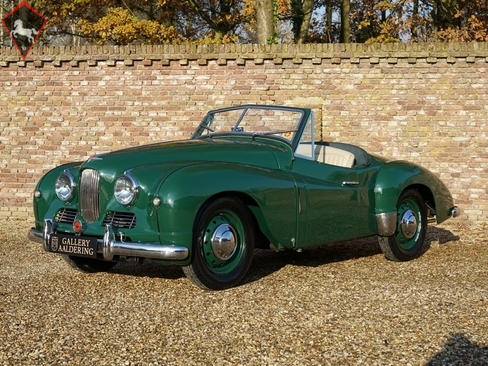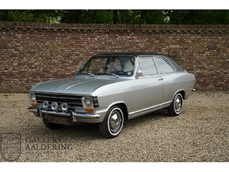Jowett Jupiter Mk1 only 731 made! 1951
General description :
We have a rare 1951 Jowett Jupiter. This Jowett won the Rally Automóvel Internacional de Lisboa in 1951. Unique and proven 50's racing history. Jowett Cars Ltd. was an English brand that made a lot of 2-cylinder cars. After the Second World War they developed the Javelin saloon, an attractive fastback with a 1486cc overhead valve engine. 1951 saw the introduction of the sporty 2-seater Jupiter. The bodywork styling is particularly fine in its execution. Only 731 Mk1’s were ever produced. The Jupiter used the Javelin engine in an innovative tubular frame, designed by the Austrian engineer Robert Eberan von Eberhorst. It has a lovely Uni-Green finish with light tan leather interior trim and a wooden dashboard. This 3-seater also has column gear shift. The fine bodywork has good quality and well-aligned body panels. The good paintwork has a nice lustre. This is a prime example of the rich English car heritage, unique and seldom available. Gallery Aaldering is Europe’s leading Classic Cars specialist since 1975! Always 300-350 Classic and Sportscars in stock, please visit http://www.gallery-aaldering.com for the current stock list (all offered cars are available in our showroom) and further information. We are located near the German border, 95 km from Düsseldorf and 90 km from Amsterdam. So easy traveling by plane, train, taxi and car. Transport and worldwide shipping can be arranged. No duties/import costs within Europe. We buy, sell and provide consignment sales (selling on behalf of the owner). We can arrange/provide registration/papers for our German (H-Kennzeichen, TÜV, Fahrzeugbrief, Wertgutachten usw.) and Benelux customers. Gallery Aaldering, Arnhemsestraat 47, 6971 AP Brummen, The Netherlands. Tel: 0031-575-564055. Quality, experience and transparency is what sets us apart. We look forward to welcoming you in our showroom
http://www.gallery-aaldering.com/jowett-jupiter-sports-en-2
1951 Jowett Jupiter Mk1 only 731 made! is listed sold on ClassicDigest in Brummen by Gallery Dealer for €45950.
Car Facts
Car type : Car Make : Jowett Model : Jupiter Model Version : Mk1 only 731 made! Engine size : 0.0 Model Year : 1951 Sub type : Convertible Location : Brummen
Sold
Seller Information
Sold
Other cars listed for sale by this dealer
About Jowett
The story of Jowett cars is a quintessentially British tale of innovation and engineering excellence. These vehicles, while relatively lesser-known in comparison to some British automotive giants, have their own unique charm and contributions to the automotive world.In the Beginning:
Jowett Cars Ltd. was founded in 1901 in Bradford, West Yorkshire, by brothers Benjamin and William Jowett, initially producing bicycles. In the early 1920s, they transitioned into car manufacturing, creating their first vehicle in 1921.
Jowett Models:
The Jowett brand produced a range of models over the years, each with its own distinct characteristics and contributions.
Jowett Long Two:
This was one of their early models, introduced in the 1920s. It was a compact car designed to be affordable and practical for everyday use. The Long Two was known for its simplicity and reliability.
Jowett 7:
The Jowett 7 was another popular model. Introduced in the 1930s, it was designed as a family car and featured a lightweight chassis and an efficient flat-twin engine. The 7 was a success, particularly for its economy and reliability.
Jowett Javelin:
The Jowett Javelin was a post-World War II model, introduced in 1947. It was a significant departure from their earlier designs, featuring modern styling and a horizontally opposed four-cylinder engine. The Javelin was considered advanced for its time and offered a comfortable and smooth ride.
Jowett Jupiter:
The Jowett Jupiter was a sports car model, introduced in the early 1950s. It was well-received for its sporty performance and unique design. The Jupiter was powered by the same flat-four engine found in the Javelin but had a more dynamic character.
Challenges and Closure:
Despite their engineering prowess, Jowett faced challenges over the years, including financial difficulties and intense competition from larger British automakers. In 1954, the company ceased production, marking the end of the Jowett car brand.
Legacy:
Jowett cars may not have achieved the same level of fame as some other British automakers, but they left their mark as a symbol of British engineering ingenuity and the pursuit of practical, reliable vehicles. Their commitment to innovation and their ability to adapt to changing times are part of the enduring legacy of Jowett cars.
In conclusion, the history of Jowett cars is a testament to British craftsmanship and their dedication to producing vehicles that were practical, reliable, and, in the case of the Jupiter, even sporty. While their time in the automotive industry was relatively short-lived, their unique models and contributions to British motoring history continue to be remembered by automotive enthusiasts and collectors.






